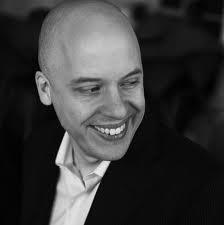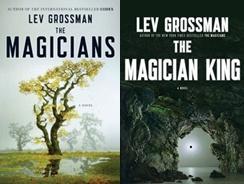
Lev Grossman hit rock bottom when he was 35 years old. "I was stuck professionally, my marriage was breaking up--it was a miserable, miserable time," said the novelist and critic, whose The Magician King (the sequel to The Magicians, which is now out in paperback) was just published by Viking. "I thought, I'm going to find one fu*king thing I enjoy. I'm too old not to be honest with myself."
Grossman, speaking from his home in Brooklyn, N.Y, continued: "There are some moments in your life when things have gone so wrong that you're up against the wall, you're cornered, you've hit rock bottom." It was 2004, and while he normally would have sought solace in the latest Harry Potter book, "we were between Harry Potter books, and so I picked up Jonathan Strange and Mr. Norrell by Susanna Clarke."
Just like the curriculum at Brakebills (the fictional school for, yes, wizards, in Grossman's The Magicians), Clarke's effect on Grossman was magical. "While reading Jonathan Strange, I realized that I could write fantasy, and do so as an adult, writing about adult emotions, with adult complexity. I could be true to myself, but also be true to my mother tongue as a writer."
Grossman's "mother tongue as a writer" has a great deal to do with his mother, who is a British-born, Oxford-educated English professor. She raised her sons (Grossman's twin, Austin, is a writer and game designer whose novel, Soon I Will Be Invincible, came out in 2008) on a steady diet of... non-British books.
Grossman explained: "I have this extremely old-world name, and people can invite me to as many Jewish book festivals as they want to--but I wasn't raised Jewish. My mother was raised Anglican, and the thing about her is that she grew up very, very poor in a bad part of London, and she knew her accent was going to doom her if she stayed there. She left, and almost never went back. But although she carefully maintains her English accent, literary England was something I had to discover on my own."
 The author said he became "obsessed" with C.S. Lewis's Narnia Chronicles. "I feel this has something to do with my real emotions, because I don't write fantasy in the epic tradition at all. I only feel able to write in this wardrobe-y, secondary world, about a young person discovering the magic part of himself. I wanted to transplant an English tradition onto American soil and see if it could grow there."
The author said he became "obsessed" with C.S. Lewis's Narnia Chronicles. "I feel this has something to do with my real emotions, because I don't write fantasy in the epic tradition at all. I only feel able to write in this wardrobe-y, secondary world, about a young person discovering the magic part of himself. I wanted to transplant an English tradition onto American soil and see if it could grow there."
Writing fantasy, Grossman noted, also means you're part of a tradition, including the modern fantasy tradition that began... in England. "T.H. White, C.S. Lewis, Hope Mirlees, all those writers," Grossman said. "Fantasy has conventions, and they aren't constraining--they're the code with which you signify. If there are no rules, there's no game. Rules create tension, and they also cry out to be broken."
The first chapter of what would become The Magicians was written in 1996. "I had just read a sequence in an Ursula K. LeGuin book where the hero discovers his talent as a magician and goes to a school for wizards on an island." Grossman paused. "Then, of course, came J.K. Rowling." When Grossman came back to his own fantasy novel, he said, "It was transporting. There's no non-clichéed word for it. It wasn't like anything else I'd ever done. I spent a week writing and put down 25,000 words. It was a career high; the words had never come like that before. I'd hit an artery."
Grossman noted that The Magicians was "such a big thing for me, such a voice-finding moment, that I thought I was writing this new novel in its shadow." So how does he explain the reviewers and readers who have deemed The Magician King a better book? "That's not the reaction I expected," he admitted. "However, I do think I learned a lot writing The Magicians, so perhaps this book is more assured."
Although the initial part of his first book came very quickly, Grossman insisted that he's a very slow writer. "This new novel was done in two years, which is lightning speed for me, so I'm not sure when the next one will be finished. I am thinking in terms of one more book about Quentin, Brakebills and the world of Fillory," he said. "It would be foolish of me to say 'no more,' and I also simply like being at the school and think there's some more action that needs to take place there."
Is he worried about eventually losing access to the magical world he's created? Not at all, Grossman said. "There are some things you can't lose, because they're part of who you are. I've finally figured out what kinds of books I want to write--and I want to write as many of them as I can." --Bethanne Patrick

